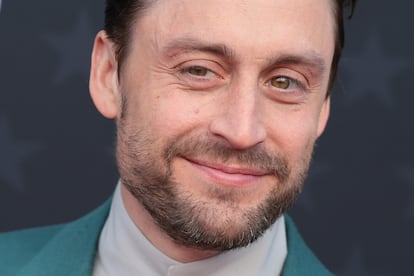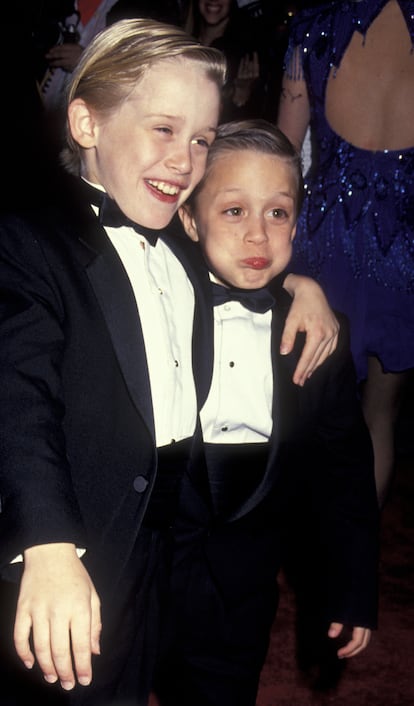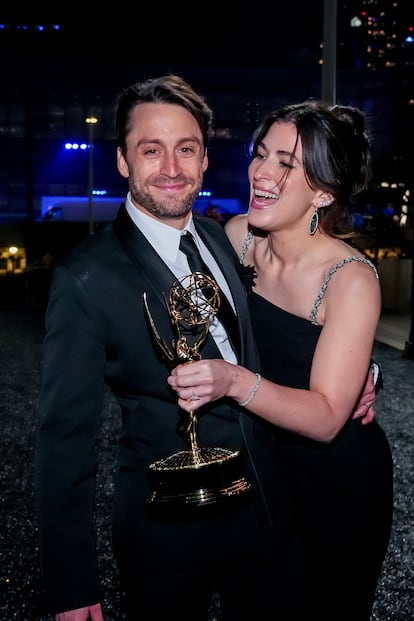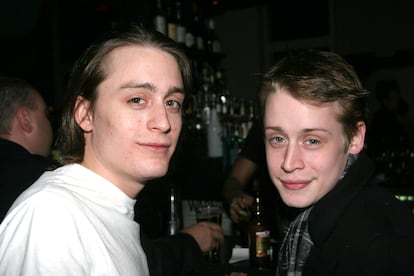The unexpected triumph of Kieran Culkin, after the long shadow of Macaulay and a chaotic family of seven siblings
Thanks to his role as the insufferable Roman Roy in the series ‘Succession,’ the actor is winning all the awards of the season. The last few have been dedicated to his mother, Patricia, who raised him and his siblings in a tiny apartment in New York City


On Monday, January 15, Kieran Culkin took home an Emmy Award. The day before that, on Sunday, he collected the Critics Choice Award. And the previous week, he won a Golden Globe.
The Screen Actors Guild Awards, the People’s Choice Awards and the Hollywood Critics Association TV Awards are still pending. Culkin is nominated by all groups. After more than 30 years in films, plays and TV series, it seems incredible that the 41-year-old’s career is finally beginning to take flight. He’s grabbing critics by the lapels and making audiences laugh and cry. They now recognize him by his face and name — they know who he is. He’s Kieran — not Rory, and not Macaulay.
Kieran is the middle child of seven siblings. They grew up as child actors (for pleasure, or forced). It’s only in recent years that, thanks to his efforts — and thanks to his role as the unbearable Roman Roy in the hit HBO TV show Succession — that he’s been crowned with success. His performance as the youngest son of media magnate Logan Roy (played by the iconic Brian Cox) over the course of four seasons has swept up audiences and critics alike. The role has changed Culkin’s life.
Kieran Culkin — who played his real-life brother Macaulay’s fictional brother in Home Alone, back in 1990 — wasn’t sure he wanted to be an actor. He was never really interested in the industry, unlike the sibling immediately after him — Rory, an acting talent who always liked the camera — or the second, Dakota, who, until her death 14 years ago, opted for production. But as part of the cast of Succession, he realized that this was his path.
“I think it was at the end of the first season,” he recalled, during an interview a couple of years ago with The Hollywood Reporter. “I remember coming home and thinking, ‘This is what I want to do with my life. I think I want to be an actor.’ I was, like, 36. I’d already been doing it for 30 years.”
As part of Succession, he also made new friends, including J. Smith-Cameron (who plays the family lawyer, Gerri Kellman) — whom he had known for years — and, above all, Sarah Snook, who played his character’s sister, Shiv. She became almost another sister off-screen as well. Their strong connection is evident at all the award ceremonies, where they embrace each other.

At the Golden Globes and the Emmys, Kieran also had messages of gratitude for three other women. Firstly, for one who knows him best: agent Emily Gerson Saines, who has represented the Culkins for three decades. In an interview with Vanity Fair, she noted how, for a time, “Kieran wasn’t particularly into [acting]. Neither Macaulay nor Kieran chose to act. It was, to a large degree, chosen for them. I think no one can understand the lives they’ve led but them. They have common experiences that are impossible to explain to people.”
The second woman Kieran thanked was his wife of more than 10 years, the British citizen Jazz Charton. When they met 12 years ago in a bar, she was working in the music department at an advertising agency in New York. They have two children, and he wants more, as he made clear at the Emmys. And, finally, he expressed his gratitude to his mother, Patricia Brentrup, 69, who’s been struggling with her health, as became known days after Monday night’s ceremony. On the verge of tears, the actor thanked her “for giving me life and my childhood, which was great.”
Brentrup lives on a ranch in Montana with her husband of 12 years, Mart Cox. She separated from her children’s father, Kit Culkin (whom she never married), in the mid-1990s. The family lived in New York and, every couple of years, they brought a child into the world in her tiny apartment, a studio in northern Manhattan. She took care of the house and the kids and, in the evenings, she was a telephone operator for a theatrical casting agency, while he — in addition to having a job as a sexton on the Upper East Side, which provided free Catholic education for his children — took all the kids to their auditions. Kit Culkin would eventually head to Hollywood, where he became a hated figure.
Some friends of the couple managed a small theater in Manhattan. Whenever they needed a child performer, depending on age and gender, Kit appeared with one or the other. School was secondary. “They were so poor I had to use my own money to make sure that he got to and from rehearsal,” casting director Billy Hopkins recalled, in an interview with New York Magazine in 2001. “Macaulay would crawl under the bleachers at the theater to look for change that had fallen out of people’s pockets.”

Macaulay managed to succeed, get his family out of the bunk beds in that hovel next to the subway tracks and give a running start to his siblings. In addition to Christian, Dakota, Macaulay, Kieran, Rory, Shane and Quinn, Kit also had an older daughter, Jennifer, who was born in 1970. She grew up in Montana and died of an overdose in 2000.
Macaulay made a fortune in Hollywood, although it came with fame that he never wanted. “I knew my life was unique, but it wasn’t until I got older that I really understood exactly how unique it was. We were just another family on the block, and then, all of a sudden, there was a sea change in the way that even the neighborhood kids would treat us. So we were always really protective of each other,” he said in 2018, in an interview with Vanity Fair. “We can’t really look around and find someone who’s had a similar upbringing. It’s added to our closeness.”
“Poor fucking guy,” Kieran Culkin said of his brother, in a recent interview with Esquire. “He was little and having to try to accept that level of fame as reality. Even at that time, as a kid, I remember thinking, ‘that sucks for him.’”
Today, with a band — The Pizza Underground — a podcast and two young children, Macaulay Culkin describes himself as “basically a 30-something-year-old retiree.”
Kieran’s experience is almost the opposite of his brother’s. His brief appearance in Home Alone led to roles in the two installments of Father of the Bride (1991 and 1995). Still, this brought him limited fame. From that point onwards, he acted in about one film per year. In 1999, he ended his childhood with The Cider House Rules, based on the novel by John Irving. In 2002, he began his adolescence with Igby Goes Down.
At the age of 18, he became financially independent. His mother helped him furnish and buy pans for his rented apartment in Manhattan’s East Village. He lived there until a couple of years ago, when his youngest son was born. The family then moved to Brooklyn, although he has kept his old studio as a rehearsal space. Patricia also moved to Brooklyn for a few months to help with her young grandchildren.

Beyond Scott Pilgrim vs. The World (2010), his career was made up of minor roles and dubbing cartoons. That is, until Succession arrived. He was initially approached to play Cousin Greg, but from the first moment, he knew that he had to be Roman Roy.
He recorded three scenes and they were sent to Jesse Armstrong, the creator of the series. The connection between the two men was profound — he was given the role immediately.
Kieran has never attended an acting school or followed a particular method. “I was just sort of already doing it, continued to do it, and then, ‘Oh, shit, I have a career!’” he commented in Vanity Fair.
But it was 30 years earlier when fame changed the lives of all the Culkins. Kit — an actor in his youth — began managing his children’s careers. He fought with studio executives, who complained about his poor hygiene and body odor. They also were at odds with the absolute control he exercised over his children — they clashed with his tyrannical nature, his threats and his bad manners, which have been reported in the press. Macaulay has even accused his father of physical and psychological abuse — of feeling “jealous” of him, as he said in his podcast: “Everything he tried to do in life, I had more than achieved [by the age] of 10.”
In 1994 — the year he filmed Richie Rich — Macaulay Culkin stood up to his father. He refused to continue being a money-making machine. There was a widely-covered custody battle over him, which he requested. His mother won.
Kieran, for his part, sees Kit with more distance. He never had a good relationship with his father, but he doesn’t consider him to be an abuser. “He’s not a good dude, but he wasn’t really a big part of my life after the age of 15,” he told Vanity Fair in 2018. He recalled how, at some point in the 1990s, Kit left home for a couple of weeks and no one asked about him. “Nobody cared, actually. My mom was the parent, so when he wasn’t there it was nicer and better.”
The boys — now adults — have no relationship with their father. About a decade ago, Kit Culkin had a heart attack that affected his speech and movement. It was around then that Kieran saw him for the last time. It was 2014: Kit went to see him at the theater on Broadway. They greeted each other backstage. And that was it.
“Fuck him,” Culkin told The Hollywood Reporter. “I don’t care.”
Despite the hurricane of early fame (“I’ll totally take personal happiness over success, absolutely,” Kieran has commented), the Culkins are still together. Macaulay received his star on the Hollywood Walk of Fame on December 1. His partner — actress Brenda Song — his children and his brothers Rory and Quinn accompanied him, as did his goddaughter, Paris Jackson. His mother couldn’t come from Montana due to her health.

There’s only one thing missing from the Culkins’ lives: Dakota. The second of the siblings died in December 2008, at the age of 30. She was leaving a bar in Marina del Rey, south of Los Angeles, when she was hit by a car. The driver hadn’t been drinking or taking drugs: she was in rehab for her alcoholism. The family was devastated — they canceled all their projects. “That’s the worst thing that’s ever happened, and there’s no sugarcoating that one,” Keiran acknowledged. “Each one [of us] managed it in a different way. I think we all turned upside down.”
Although it’s been more than 15 years, Kieran knows the wound will never heal. “It’s always going to be devastating,” the actor told The Hollywood Reporter. “I still weep about it out of nowhere. Something funny she did will pop in the head and make me laugh, and then I’m weeping. Sometimes it’s knowing that she’s not going to meet my kids and they don’t get to have her, and it’s hard to describe what she was like.”
Right now, Kieran is fulfilling his dream job… and it’s not that of an actor, despite all the awards for Succession, or the upcoming release of his new film A Real Pain, with Jesse Eisenberg. No, his dream job is being able to be at home and with his children.
“I feel like what I’m supposed to do is be a stay-at-home dad,” he told Esquire a few months ago.”That’s where I feel like I’m the most me. And anything that takes me away from that is wrong.” For the Culkins — for 30 years — family has always come first.
Sign up for our weekly newsletter to get more English-language news coverage from EL PAÍS USA Edition
Tu suscripción se está usando en otro dispositivo
¿Quieres añadir otro usuario a tu suscripción?
Si continúas leyendo en este dispositivo, no se podrá leer en el otro.
FlechaTu suscripción se está usando en otro dispositivo y solo puedes acceder a EL PAÍS desde un dispositivo a la vez.
Si quieres compartir tu cuenta, cambia tu suscripción a la modalidad Premium, así podrás añadir otro usuario. Cada uno accederá con su propia cuenta de email, lo que os permitirá personalizar vuestra experiencia en EL PAÍS.
¿Tienes una suscripción de empresa? Accede aquí para contratar más cuentas.
En el caso de no saber quién está usando tu cuenta, te recomendamos cambiar tu contraseña aquí.
Si decides continuar compartiendo tu cuenta, este mensaje se mostrará en tu dispositivo y en el de la otra persona que está usando tu cuenta de forma indefinida, afectando a tu experiencia de lectura. Puedes consultar aquí los términos y condiciones de la suscripción digital.








































